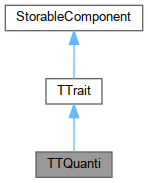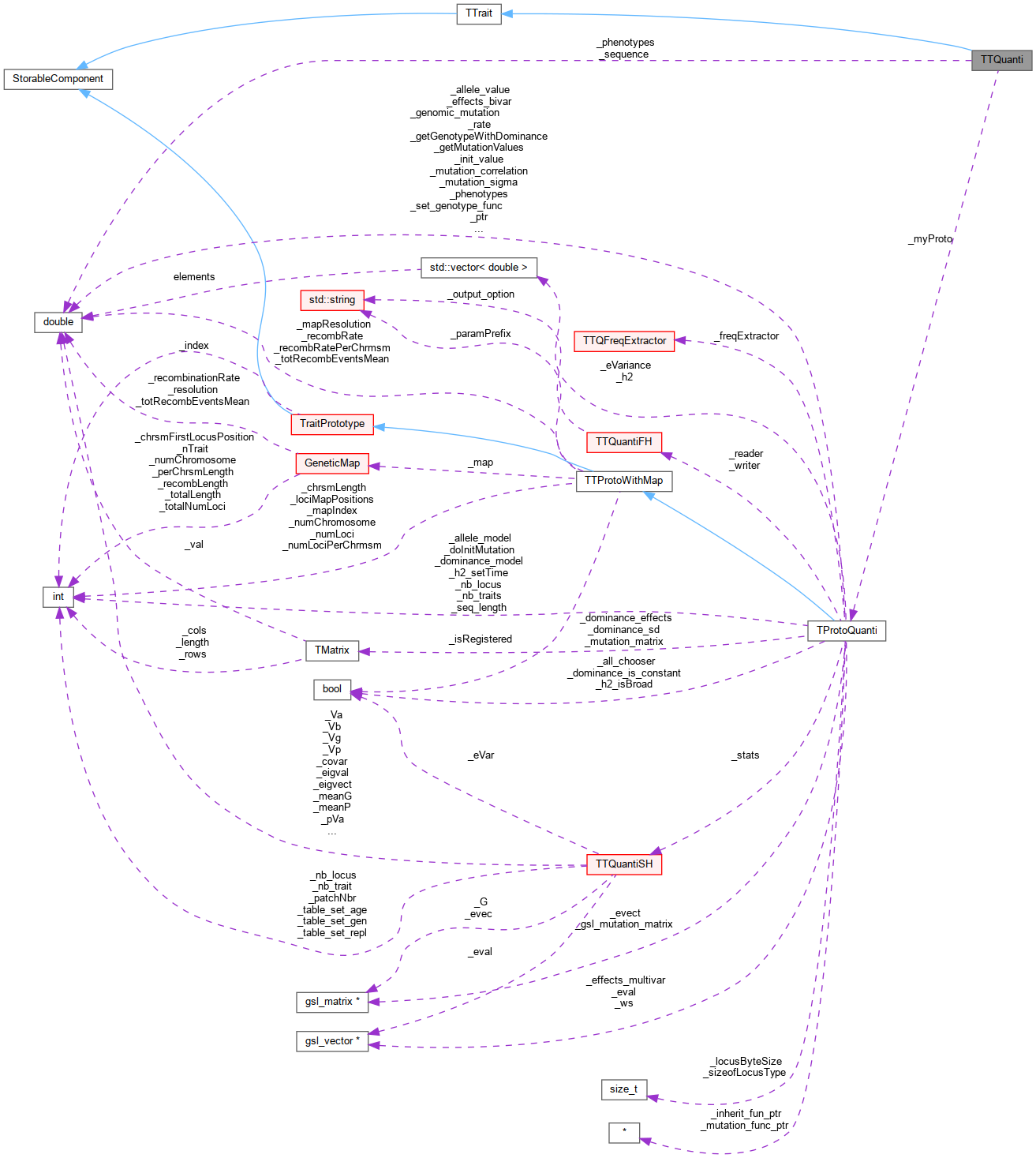#include <ttquanti.h>
 Inheritance diagram for TTQuanti:
Inheritance diagram for TTQuanti: Collaboration diagram for TTQuanti:
Collaboration diagram for TTQuanti:Public Member Functions | |
| TTQuanti () | |
| TTQuanti (const TTQuanti &T) | |
| virtual | ~TTQuanti () |
| virtual trait_t | get_type () const |
| virtual void | mutate () |
| virtual void | inherit (const TTrait *mother, const TTrait *father) |
| virtual void * | set_trait (void *value) |
| virtual void | set_value () |
| virtual void * | getValue () const |
| virtual double | get_additive_genotype (const unsigned int trait) const =0 |
| virtual double | get_dominant_genotype (const unsigned int trait) const =0 |
| virtual double | get_full_genotype (unsigned int trait)=0 |
| virtual void | copy_sequence_block (sex_t SEX, unsigned int strand, unsigned int from_pos, unsigned int to_pos, const TTQuanti *parent)=0 |
| virtual void | copy_sequence_1locus (sex_t SEX, unsigned int strand, unsigned int at, const TTQuanti *parent)=0 |
| virtual void | mutate_add (unsigned int position, unsigned int allele, double value)=0 |
| virtual void | mutate_inplace (unsigned int position, unsigned int allele, double value)=0 |
| virtual bool | get_allele_bit (unsigned int position, unsigned int allele) const =0 |
| virtual void | set_allele_bit (unsigned int position, unsigned int allele, bool value)=0 |
| void | set_proto (TProtoQuanti *proto) |
| TProtoQuanti * | get_proto () |
| double | get_phenotype (unsigned int trai) |
| void | set_phenotype (unsigned int trait, double value) |
 Public Member Functions inherited from TTrait Public Member Functions inherited from TTrait | |
| virtual void | init ()=0 |
| Called to allocate the trait's genotypic sequences. More... | |
| virtual void | init_sequence ()=0 |
| Called at the start of each replicate, sets the initial genotypes. More... | |
| virtual void | reset ()=0 |
| Called at the end of each simulation/replicate, deallocates sequence memory. More... | |
| virtual void | set_sequence (void **seq)=0 |
| Called to set the sequence pointer to an existing trait. More... | |
| virtual double | get_allele_value (int loc, int all) const =0 |
| Called to read one allele value at a particular locus. More... | |
| virtual void | set_allele_value (unsigned int locus, unsigned int allele, double value)=0 |
| Called to change the allelic value at a particular locus. More... | |
| virtual void ** | get_sequence () const =0 |
| sequence accessor. More... | |
| virtual void | show_up ()=0 |
| Writes some info to stdout. More... | |
| virtual TTrait * | clone ()=0 |
| Returns a copy of itself. More... | |
| virtual | ~TTrait () |
| virtual TTrait & | operator= (const TTrait &)=0 |
| Copies the complete state of the trait from right to left side of the operator, sequence data included. More... | |
| virtual bool | operator== (const TTrait &)=0 |
| Checks for parameters equivalence, not genetic equivalence. More... | |
| virtual bool | operator!= (const TTrait &)=0 |
 Public Member Functions inherited from StorableComponent Public Member Functions inherited from StorableComponent | |
| virtual void | store_data (BinaryStorageBuffer *saver)=0 |
| Interface to store the component data (e.g. gene values) into a binary buffer. More... | |
| virtual bool | retrieve_data (BinaryStorageBuffer *reader)=0 |
| Interface to retrieve the same data from the binary buffer. More... | |
| virtual | ~StorableComponent () |
Protected Attributes | |
| double * | _phenotypes |
| TProtoQuanti * | _myProto |
Detailed Description
Constructor & Destructor Documentation
◆ TTQuanti() [1/2]
|
inline |
◆ TTQuanti() [2/2]
|
inline |
◆ ~TTQuanti()
Member Function Documentation
◆ copy_sequence_1locus()
|
pure virtual |
Implemented in TTQuanti_diallelic_var_pleio, TTQuanti_diallelic_full_pleio, TTQuanti_diallelic_no_pleio, TTQuanti_continuous_single, TTQuanti_continuous_no_pleio, TTQuanti_continuous_var_pleio, TTQuanti_continuous_full_pleio, TTQuanti_diallelic_no_pleio_epistasis, TTQuanti_continuous_no_pleio_epistasis, TTQuanti_diallelic_full_pleio_epistasis, TTQuanti_continuous_full_pleio_epistasis, TTQuanti_diallelic_bitstring_var_pleio, TTQuanti_diallelic_bitstring_full_pleio, and TTQuanti_diallelic_bitstring_no_pleio.
Referenced by TProtoQuanti::inherit_free().
◆ copy_sequence_block()
|
pure virtual |
Implemented in TTQuanti_diallelic_var_pleio, TTQuanti_diallelic_full_pleio, TTQuanti_diallelic_no_pleio, TTQuanti_continuous_single, TTQuanti_continuous_no_pleio, TTQuanti_continuous_var_pleio, TTQuanti_continuous_full_pleio, TTQuanti_diallelic_no_pleio_epistasis, TTQuanti_continuous_no_pleio_epistasis, TTQuanti_diallelic_full_pleio_epistasis, TTQuanti_continuous_full_pleio_epistasis, TTQuanti_diallelic_bitstring_var_pleio, TTQuanti_diallelic_bitstring_full_pleio, and TTQuanti_diallelic_bitstring_no_pleio.
Referenced by TProtoQuanti::inherit_low().
◆ get_additive_genotype()
|
pure virtual |
Implemented in TTQuanti_diallelic_no_pleio_epistasis, TTQuanti_continuous_no_pleio_epistasis, TTQuanti_diallelic_full_pleio_epistasis, TTQuanti_continuous_full_pleio_epistasis, TTQuanti_diallelic_bitstring_var_pleio, TTQuanti_diallelic_bitstring_full_pleio, TTQuanti_diallelic_bitstring_no_pleio, TTQuanti_diallelic_var_pleio, TTQuanti_diallelic_full_pleio, TTQuanti_diallelic_no_pleio, TTQuanti_continuous_single, TTQuanti_continuous_no_pleio, TTQuanti_continuous_var_pleio, and TTQuanti_continuous_full_pleio.
Referenced by TTQuantiSH::getVaNoDominance(), TTQuantiFH::print(), and TProtoQuanti::set_genotype_value_additive().
◆ get_allele_bit()
|
pure virtual |
Implemented in TTQuanti_diallelic_bitstring, TTQuanti_diallelic, and TTQuanti_continuous.
Referenced by TTQFreqExtractor::FHwrite(), TTQuantiSH::getSNPalleleFreqInPatch(), TTQuantiSH::getVaWithDominance(), TProtoQuanti::mutate_diallelic_pleio(), TProtoQuanti::mutate_diallelic_var_pleio(), and TTQuantiFH::print().
◆ get_dominant_genotype()
|
pure virtual |
Implemented in TTQuanti_diallelic_no_pleio_epistasis, TTQuanti_continuous_no_pleio_epistasis, TTQuanti_diallelic_full_pleio_epistasis, TTQuanti_continuous_full_pleio_epistasis, TTQuanti_diallelic_bitstring_var_pleio, TTQuanti_diallelic_bitstring_full_pleio, TTQuanti_diallelic_bitstring_no_pleio, TTQuanti_diallelic_var_pleio, TTQuanti_diallelic_full_pleio, TTQuanti_diallelic_no_pleio, TTQuanti_continuous_single, TTQuanti_continuous_no_pleio, TTQuanti_continuous_var_pleio, and TTQuanti_continuous_full_pleio.
Referenced by TProtoQuanti::set_genotype_value_dominance().
◆ get_full_genotype()
|
pure virtual |
Implemented in TTQuanti_diallelic_bitstring, TTQuanti_diallelic, and TTQuanti_continuous.
Referenced by TTQuantiSH::getVaWithDominance(), TTQuantiFH::print(), and store_quanti_trait_values().
◆ get_phenotype()
| double TTQuanti::get_phenotype | ( | unsigned int | trai | ) |
◆ get_proto()
|
inline |
◆ get_type()
|
inlinevirtual |
Implements TTrait.
References QUANT.
Referenced by TTQuanti_continuous::operator==(), TTQuanti_diallelic::operator==(), and TTQuanti_diallelic_bitstring::operator==().
◆ getValue()
|
inlinevirtual |
Implements TTrait.
References _phenotypes.
Referenced by TTQuantiFH::print(), and store_quanti_trait_values().
◆ inherit()
Implements TTrait.
References _myProto, FEM, TProtoQuanti::inherit(), and MAL.
◆ mutate()
|
inlinevirtual |
◆ mutate_add()
|
pure virtual |
Implemented in TTQuanti_diallelic_bitstring, TTQuanti_diallelic, and TTQuanti_continuous.
Referenced by TProtoQuanti::mutate_full_pleio(), TProtoQuanti::mutate_no_pleio(), and TProtoQuanti::mutate_var_pleio().
◆ mutate_inplace()
|
pure virtual |
Implemented in TTQuanti_diallelic_bitstring, TTQuanti_diallelic, and TTQuanti_continuous.
Referenced by TProtoQuanti::mutate_diallelic_no_pleio(), TProtoQuanti::mutate_diallelic_pleio(), TProtoQuanti::mutate_diallelic_var_pleio(), TProtoQuanti::mutate_inplace_full_pleio(), TProtoQuanti::mutate_inplace_no_pleio(), and TProtoQuanti::mutate_inplace_var_pleio().
◆ set_allele_bit()
|
pure virtual |
Implemented in TTQuanti_diallelic_bitstring, TTQuanti_diallelic, and TTQuanti_continuous.
Referenced by TProtoQuanti::mutate_diallelic_pleio(), and TProtoQuanti::mutate_diallelic_var_pleio().
◆ set_phenotype()
| void TTQuanti::set_phenotype | ( | unsigned int | trait, |
| double | value | ||
| ) |
◆ set_proto()
|
inline |
◆ set_trait()
|
inlinevirtual |
Implements TTrait.
◆ set_value()
|
inlinevirtual |
Implements TTrait.
References _myProto, _phenotypes, TProtoQuanti::get_num_traits(), and TProtoQuanti::get_phenotypic_value().
Referenced by TTQuantiFH::FHread(), TTQuanti_continuous::operator=(), TTQuanti_diallelic::operator=(), and TTQuanti_diallelic_bitstring::operator=().
Member Data Documentation
◆ _myProto
|
protected |
Referenced by TTQuanti_diallelic_bitstring_full_pleio::copy_sequence_1locus(), TTQuanti_diallelic_bitstring_var_pleio::copy_sequence_1locus(), TTQuanti_continuous_full_pleio_epistasis::copy_sequence_1locus(), TTQuanti_diallelic_full_pleio_epistasis::copy_sequence_1locus(), TTQuanti_continuous_full_pleio::copy_sequence_1locus(), TTQuanti_continuous_var_pleio::copy_sequence_1locus(), TTQuanti_diallelic_full_pleio::copy_sequence_1locus(), TTQuanti_diallelic_var_pleio::copy_sequence_1locus(), TTQuanti_diallelic_bitstring_full_pleio::copy_sequence_block(), TTQuanti_diallelic_bitstring_var_pleio::copy_sequence_block(), TTQuanti_continuous_full_pleio_epistasis::copy_sequence_block(), TTQuanti_diallelic_full_pleio_epistasis::copy_sequence_block(), TTQuanti_continuous_no_pleio_epistasis::copy_sequence_block(), TTQuanti_diallelic_no_pleio_epistasis::copy_sequence_block(), TTQuanti_continuous_full_pleio::copy_sequence_block(), TTQuanti_continuous_var_pleio::copy_sequence_block(), TTQuanti_continuous_no_pleio::copy_sequence_block(), TTQuanti_diallelic_no_pleio::copy_sequence_block(), TTQuanti_diallelic_full_pleio::copy_sequence_block(), TTQuanti_diallelic_var_pleio::copy_sequence_block(), TTQuanti_continuous_full_pleio::get_additive_genotype(), TTQuanti_continuous_var_pleio::get_additive_genotype(), TTQuanti_continuous_no_pleio::get_additive_genotype(), TTQuanti_continuous_single::get_additive_genotype(), TTQuanti_diallelic_no_pleio::get_additive_genotype(), TTQuanti_diallelic_full_pleio::get_additive_genotype(), TTQuanti_diallelic_var_pleio::get_additive_genotype(), TTQuanti_diallelic_bitstring_no_pleio::get_additive_genotype(), TTQuanti_diallelic_bitstring_full_pleio::get_additive_genotype(), TTQuanti_diallelic_bitstring_var_pleio::get_additive_genotype(), TTQuanti_continuous_full_pleio_epistasis::get_additive_genotype(), TTQuanti_diallelic_full_pleio_epistasis::get_additive_genotype(), TTQuanti_continuous_no_pleio_epistasis::get_additive_genotype(), TTQuanti_diallelic_no_pleio_epistasis::get_additive_genotype(), TTQuanti_diallelic_bitstring::get_allele_bit(), TTQuanti_continuous::get_allele_value(), TTQuanti_diallelic::get_allele_value(), TTQuanti_diallelic_bitstring::get_allele_value(), TTQuanti_continuous_full_pleio::get_dominant_genotype(), TTQuanti_continuous_var_pleio::get_dominant_genotype(), TTQuanti_continuous_no_pleio::get_dominant_genotype(), TTQuanti_continuous_single::get_dominant_genotype(), TTQuanti_diallelic_no_pleio::get_dominant_genotype(), TTQuanti_diallelic_full_pleio::get_dominant_genotype(), TTQuanti_diallelic_var_pleio::get_dominant_genotype(), TTQuanti_diallelic_bitstring_no_pleio::get_dominant_genotype(), TTQuanti_diallelic_bitstring_full_pleio::get_dominant_genotype(), TTQuanti_diallelic_bitstring_var_pleio::get_dominant_genotype(), TTQuanti_continuous_full_pleio_epistasis::get_dominant_genotype(), TTQuanti_diallelic_full_pleio_epistasis::get_dominant_genotype(), TTQuanti_continuous_no_pleio_epistasis::get_dominant_genotype(), TTQuanti_diallelic_no_pleio_epistasis::get_dominant_genotype(), TTQuanti_continuous_full_pleio_epistasis::get_epistatic_genotype(), TTQuanti_diallelic_full_pleio_epistasis::get_epistatic_genotype(), TTQuanti_continuous_no_pleio_epistasis::get_epistatic_genotype(), TTQuanti_diallelic_no_pleio_epistasis::get_epistatic_genotype(), TTQuanti_continuous::get_full_genotype(), TTQuanti_diallelic::get_full_genotype(), TTQuanti_diallelic_bitstring::get_full_genotype(), get_proto(), TTQuanti_continuous_var_pleio::get_sequence_block_size(), TTQuanti_diallelic_var_pleio::get_sequence_block_size(), TTQuanti_diallelic_bitstring_var_pleio::get_sequence_block_size(), inherit(), TTQuanti_continuous::init(), TTQuanti_diallelic::init(), TTQuanti_diallelic_bitstring::init(), TTQuanti_continuous_full_pleio::init_sequence(), TTQuanti_continuous_var_pleio::init_sequence(), TTQuanti_continuous_no_pleio::init_sequence(), TTQuanti_diallelic_no_pleio::init_sequence(), TTQuanti_diallelic_full_pleio::init_sequence(), TTQuanti_diallelic_var_pleio::init_sequence(), TTQuanti_diallelic_bitstring_no_pleio::init_sequence(), TTQuanti_diallelic_bitstring_full_pleio::init_sequence(), TTQuanti_diallelic_bitstring_var_pleio::init_sequence(), TTQuanti_continuous_full_pleio_epistasis::init_sequence(), TTQuanti_diallelic_full_pleio_epistasis::init_sequence(), TTQuanti_continuous_no_pleio_epistasis::init_sequence(), TTQuanti_diallelic_no_pleio_epistasis::init_sequence(), mutate(), TTQuanti_continuous::operator=(), TTQuanti_diallelic::operator=(), TTQuanti_continuous::operator==(), TTQuanti_diallelic::operator==(), TTQuanti_diallelic_bitstring::operator==(), TTQuanti_continuous::retrieve_data(), TTQuanti_diallelic::retrieve_data(), TTQuanti_diallelic_bitstring::set_allele_bit(), TTQuanti_diallelic::set_allele_value(), TTQuanti_diallelic_bitstring::set_allele_value(), set_proto(), TTQuanti_continuous::set_sequence(), TTQuanti_diallelic::set_sequence(), set_value(), TTQuanti_continuous_full_pleio::show_up(), TTQuanti_continuous_var_pleio::show_up(), TTQuanti_continuous_no_pleio::show_up(), TTQuanti_diallelic_no_pleio::show_up(), TTQuanti_diallelic_full_pleio::show_up(), TTQuanti_diallelic_var_pleio::show_up(), TTQuanti_diallelic_bitstring_no_pleio::show_up(), TTQuanti_diallelic_bitstring_full_pleio::show_up(), TTQuanti_diallelic_bitstring_var_pleio::show_up(), TTQuanti_continuous_full_pleio_epistasis::show_up(), TTQuanti_diallelic_full_pleio_epistasis::show_up(), TTQuanti_continuous_no_pleio_epistasis::show_up(), TTQuanti_diallelic_no_pleio_epistasis::show_up(), TTQuanti_continuous::store_data(), and TTQuanti_diallelic::store_data().
◆ _phenotypes
|
protected |
Referenced by get_phenotype(), getValue(), TTQuanti_continuous::init(), TTQuanti_diallelic::init(), TTQuanti_diallelic_bitstring::init(), TTQuanti_continuous::reset(), TTQuanti_diallelic::reset(), TTQuanti_diallelic_bitstring::reset(), set_phenotype(), set_value(), TTQuanti_continuous_full_pleio::show_up(), TTQuanti_continuous_var_pleio::show_up(), TTQuanti_continuous_no_pleio::show_up(), TTQuanti_diallelic_no_pleio::show_up(), TTQuanti_diallelic_full_pleio::show_up(), TTQuanti_diallelic_var_pleio::show_up(), TTQuanti_diallelic_bitstring_no_pleio::show_up(), TTQuanti_diallelic_bitstring_full_pleio::show_up(), TTQuanti_diallelic_bitstring_var_pleio::show_up(), TTQuanti_continuous_full_pleio_epistasis::show_up(), TTQuanti_diallelic_full_pleio_epistasis::show_up(), TTQuanti_continuous_no_pleio_epistasis::show_up(), and TTQuanti_diallelic_no_pleio_epistasis::show_up().
The documentation for this class was generated from the following files:


 1.9.1 -- Nemo is hosted on
1.9.1 -- Nemo is hosted on 
